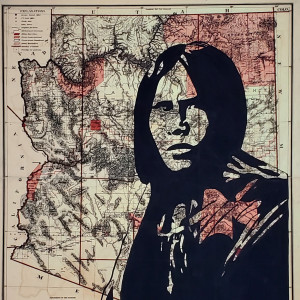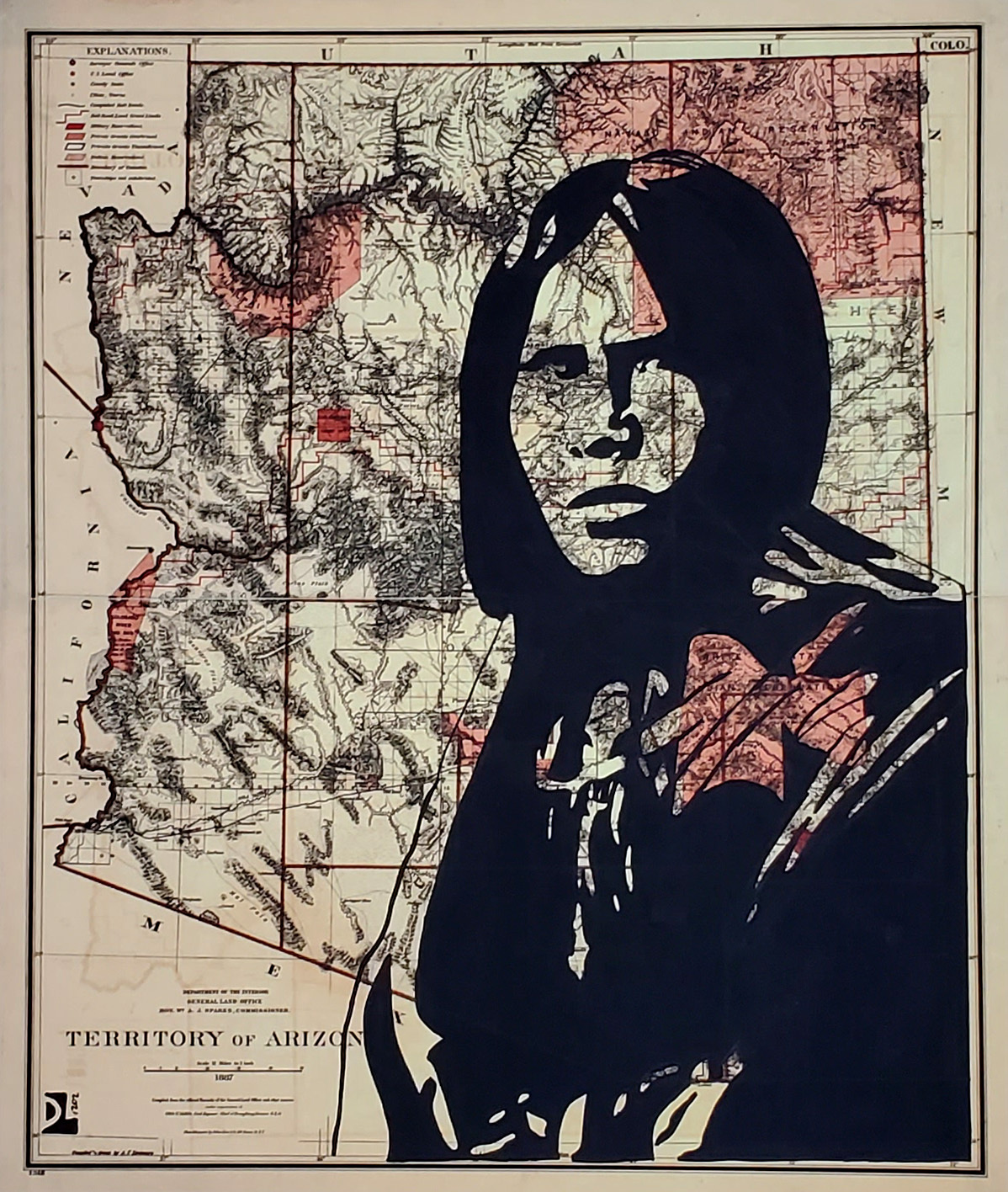
Tuesday Feb 15, 2022
Lozen: Powerful Apache warrior and medicine woman
“Lozen is as my right hand, strong as a man, braver than most, and cunning in strategy. Lozen is a shield to her people.”
Victorio, Apache chief and brother of Lozen, warrior and medicine woman

The Artwork:
Lozen’s portrait in the Fearless Portrait project consists of an ink drawing of her based on one of the rare existing photographs of her. I’ve drawn her on an 1887 map of Arizona. The San Carlos reservation appears on the map as a red blotch on her shoulder near her heart.
The Story:
In 1877, Lozen and a band of Chiricahua Apaches led by her older brother, Victorio, escaped from the San Carlos Reservation in Arizona. Fleeing terrible living conditions so bad that US soldiers referred to the place as “Hell’s Forty Acres,” Victorio’s band rampaged against Americans who had commandeered their New Mexico homeland and cheated them out of land promised them.
The Apaches were pursued relentlessly by US and Mexican forces for the next three years. At one point, when fleeing the US Army, Lozen was leading the women and children and they came to the surging Rio Grande. Terrified of drowning in the raging river, the people began to bunch up on the riverbank, until Lozen leapt into the river.
James Kaywaykla, a child at the time, riding behind his grandmother, described the scene later, saying, “I saw a magnificent woman on a beautiful horse—Lozen, sister of Victorio. Lozen the woman warrior! High above her head she held her rifle. There was a glitter as her right foot lifted and struck the shoulder of her horse. He reared, then plunged into the torrent. She turned his head upstream, and he began swimming.”
The other women and children followed her into the river like Moses into the Red Sea. They all made it across the river, cold and wet, but alive. According to Kaywaykla, Lozen came to his mother and said, “You take charge now. I must return to the warriors.” And with that, Lozen drove her horse back into the thundering river and returned to the men holding off the advancing cavalry from reaching their women and children.
At another point near the end of their campaign, Lozen left the band to escort a new mother to a reservation in New Mexico, away from the perils and hardships of the trail. (Some accounts say the woman was pregnant and others that she had a newborn baby.) Lozen and her charge left on the dangerous journey across Mexico’s harsh Chihuahua Desert with only a rifle, cartridge belt, knife and a little bit of food.
In a few days, they needed more food. Afraid to use her rifle and betray their presence to the US and Mexican cavalry forces in the area, Lozen killed a stray longhorn cow with her knife and butchered it. (All the more impressive given that the horns of a longhorn can spread up to six to eight feet, tip-to-tip). She stole horses for herself and the new mother, escaping through a hail of gunfire and finally delivered the woman and her baby to the reservation.
Background on Lozen
Lozen was born circa 1840 in what is now New Mexico. As a child, she was different. She had special gifts and talents, including supernatural powers that let her know when enemies were near. She also had a great connection with horses and was recognized as a master horsewoman with the nickname Lozen, which means “expert horse thief.” Her real name is unknown today.
Born into a time of strife, her gifts were valuable in protecting her people from the incursions of the US Army, Mexican Army, and settler militias on both sides of the Rio Grande.
Lozen eschewed marriage and the typical domestic duties of the other women in her tribe in favor of the arts of war. She became a medicine woman and warrior—an uncommon, but not completely unheard of role for a woman among her people. She often fought alongside Victorio and despite being 15 years his junior, was a trusted advisor on matters of war and religion.
Kaywaykla described Lozen’s talents thusly: “She could ride, shoot, and fight like a man, and I think she had more ability in planning military strategy than did Victorio.”
After Victorio’s death, Lozen fought beside the famed chief Geronimo in the last campaign of the Apache Wars. Lozen died of tuberculosis on June 17, 1889, in US military custody in Alabama following Geronimo’s surrender.
Music:
This episode contains music by Geovane Bruno and Daniel Carlton.
Sources:
- Ball, E., & Kaywaykla, J. (1970). In the Days of Victorio. Amsterdam University Press.
- Bovee, K. (2019a, October 26). Empowered Women of the Southwest - Lozen, Apache Warrior Woman (Part 2). Kari Bovée | Historical Mystery Author. https://karibovee.com/lozenpartii/
- Bovee, K. (2019b, October 26). Empowered Women of the Southwest - Lozen, Apache Warrior Woman (Part One). Kari Bovée | Historical Mystery Author. https://karibovee.com/empowered-women-southwest-lozen-apache-warrior-woman-2/
- Docevski, B. (2018, February 3). The “Apache Joan of Arc” and the other courageous Native American women of the 19th century. The Vintage News. https://www.thevintagenews.com/2017/11/30/native-american-women/amp/
- Gregorczyk, A. (n.d.). Longhorns: Characteristics. Longhorns. http://longhornfacts.weebly.com/characteristics.html#:%7E:text=Horns%20can%20extend%20to%20%26%20feet,of%2055%20to%2065%20inches
- Kettler, S. (2020, October 30). 5 Powerful and Influential Native American Women. Biography. https://www.biography.com/.amp/news/famous-native-american-women-native-american-heritage-month
- Kumeyaay.com. (n.d.). Lozen: The Fearless Apache Warrior Woman You’ve Probably Never Heard Of. https://www.kumeyaay.com/news/133-lozen-the-fearless-apache-warrior-woman-you-ve-probably-never-heard-of.html
- Lozen. (2021, February 2). In Wikipedia. https://en.wikipedia.org/wiki/Lozen
- Mingren, W. (2019, June 5). Lozen: An Intelligent and Brave Apache Warrior Woman. Ancient Origins. https://www.ancient-origins.net/history-famous-people/lozen-intelligent-and-brave-apache-warrior-women-005889
- New Mexico Nomad. (2019, December 29). Apache Warrior Women | Gouyen, Lozen, Dahteste. https://newmexiconomad.com/apache-warrior-women-gouyen-lozen-dahteste/
- Rodriguez, A. (2019, October 31). Lozen. Herdacity. https://herdacity.org/lozen/
- Romano, A. (2016, January 13). Lozen: The badass warrior woman you’ve probably never heard of. Mashable. https://mashable.com/archive/wtf-history-lozen
- Southern Arizona Guide. (2020, October 18). Powerful Apache Warrior Women: Lozen & Dahteste. SouthernArizonaGuide.Com. https://southernarizonaguide.com/chiricahua-apache-warrior-women-lozen-dahteste/
No comments yet. Be the first to say something!